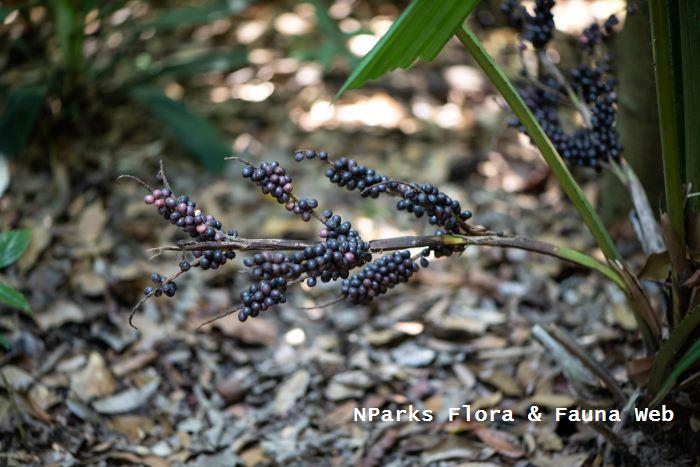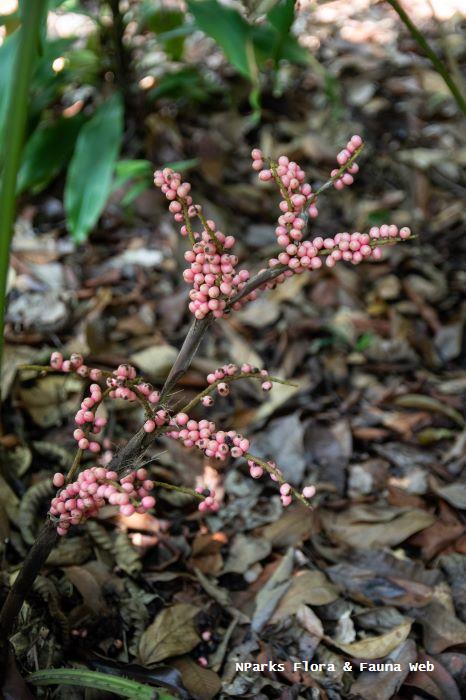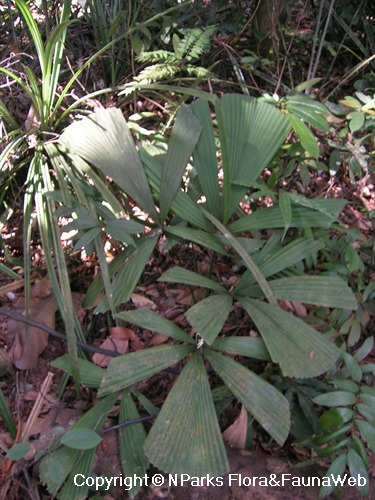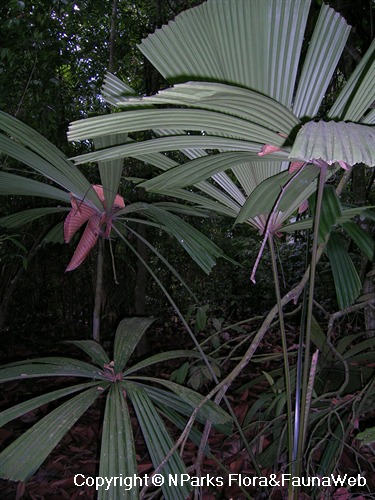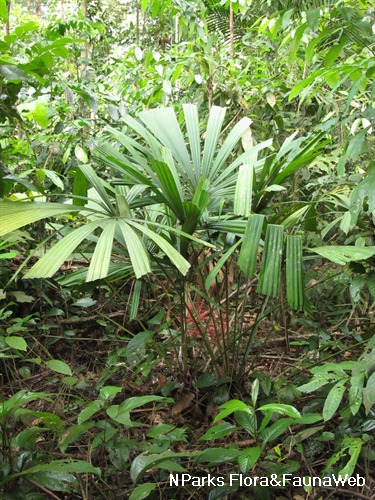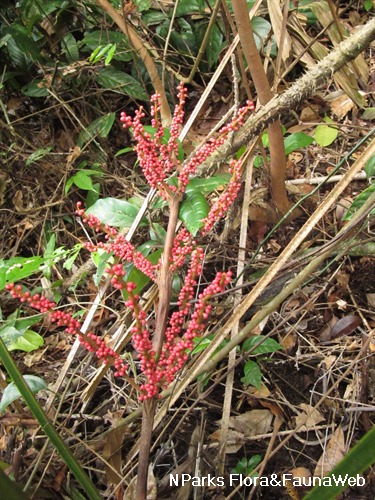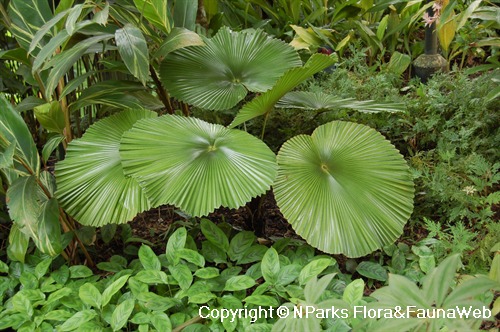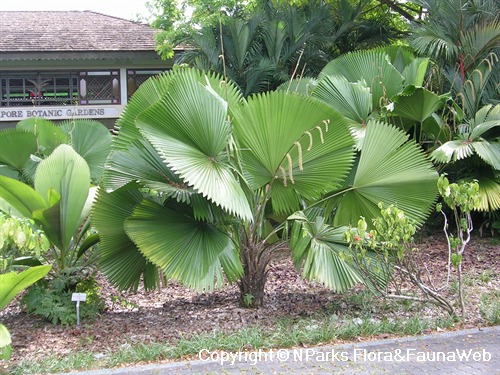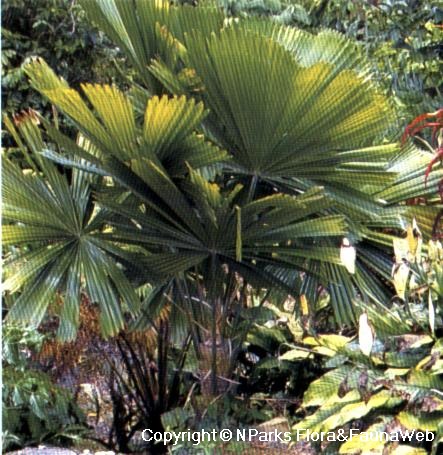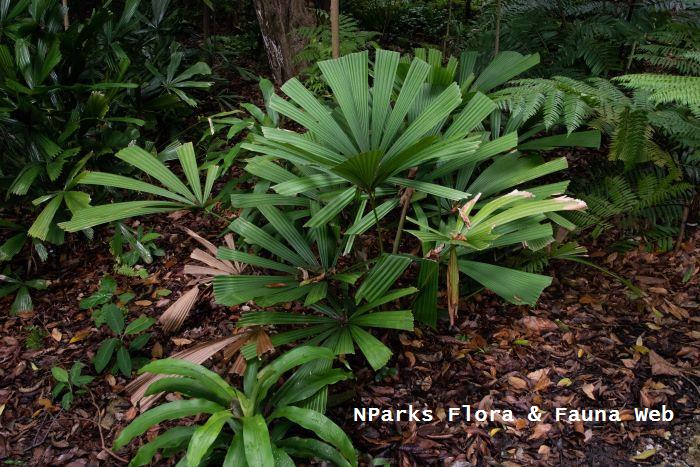
Back
Licuala ferruginea Becc.
| Family Name: | Arecaceae (Palmae) |
| Common Name: | Ferruginous Fan Palm, Palas |
Name
Classifications and Characteristics
| Plant Division | Angiosperms (Flowering Seed Plants) (Monocotyledon) |
|---|---|
| Plant Growth Form | Palm (Solitary Habit) |
| Lifespan (in Singapore) | Perennial |
| Mode of Nutrition | Autotrophic |
Biogeography
| Native Distribution | Peninsular Malaysia, Singapore, and Sumatra |
|---|---|
| Native Habitat | Terrestrial (Primary Rainforest, Freshwater Swamp Forest) |
| Preferred Climate Zone | Tropical |
| Local Conservation Status | Native to Singapore (Vulnerable (VU)) |
Description and Ethnobotany
| Growth Form | It is a short-stemmed, understorey palm that occasionally produces suckers and is up to 5 m tall. Its medium to large-sized, fan-shaped leaves have long leaf stalks and blades that are round and palmate. There are 5–20 leaves in the crown, that originate from the base of the plant, and are erect or arching. |
|---|---|
| Foliage | Its spirally arranged, stalked, medium- to large-sized leaves are erect or arching, fan-shaped, palmate, and up to 5 m long. The leaf stalks are about 1.5–3 m long, with narrowly triangular, reflexed spines in the margins of the lower portion. The leaf blades are round, 1–1.8 m wide, palmate with 10–25 linear leaflets, and dull green on both surfaces. |
| Crown Shaft | It is absent in this species. |
| Flowers | Its small flowers are 4–5 mm long and borne on a branched, spreading inflorescence that is erect or arching, often shorter than the leaves, and 0.5–1 m long. The inflorescence stalk is densely covered with rusty red hair. |
| Fruit | Its crimson to pink fruits are dark purple to black when ripe, round, and 15–17 by 12–15 cm. The initial red colour is suggested to serve as an early advertisement to birds, while subsequent pink and white stages aid in camouflaging, finally allowing the fruit to ripen to purple and black. Purple and black colouration are established visual prompts for frugivorous birds, signalling that fruits are ripe to consume. <1> |
| Habitat | It grows in seasonal swamp and moist alluvial lowland forests. It occurs locally in the Central Catchment Nature Reserve. |
| Associated Fauna | Its flowers are insect-pollinated. Its fruit has been observed to be eaten by forest birds, mainly bulbuls. <1> |
| Cultivation | It can be propagated by seed or suckers. |
| Etymology | Makassar (Moluccan) leko wala, referring to Licuala spinosa; Latin ferruginea, rusty red colour, referring to the rusty red hair covering the inflorescence |
Landscaping Features
| Landscaping | It may be suitable for parks. This plant is suitable for planting in moist, partially-shaded or shaded areas for its attractive, fan-shaped foliage. |
|---|---|
| Desirable Plant Features | Ornamental Foliage, Ornamental Fruits |
| Landscape Uses | General, Parks & Gardens, Small Gardens, Shade Providing Tree / Palm |
| Usage Hazard - Cons | Spines/Thorns - Leaf |
Fauna, Pollination and Dispersal
| Fauna Pollination Dispersal Associated Fauna | Bird-Attracting (Fruits) |
|---|---|
| Pollination Method(s) | Biotic (Fauna) |
| Seed or Spore Dispersal | Biotic (Fauna) |
Plant Care and Propagation
| Light Preference | Semi-Shade, Full Shade |
|---|---|
| Water Preference | Moderate Water |
| Plant Growth Rate | Moderate |
| Rootzone Tolerance | Moist Soils, Well-Drained Soils |
| Propagation Method | Seed, Sucker |
Foliar
| Foliage Retention | Evergreen |
|---|---|
| Mature Foliage Colour(s) | Green |
| Foliar Shape(s) | Palm Fronds (Fan / Costapalmate) |
| Leaf Area Index (LAI) for Green Plot Ratio | 2.5 (Palm - Solitary) |
Non - Foliar and Storage
| Trunk Type (Palm) | Solitary Habit, Aboveground |
|---|
Floral (Angiosperm)
| Flower Grouping | Cluster / Inflorescence |
|---|
Fruit, Seed and Spore
| Mature Fruit Colour(s) | Pink, Purple, Red |
|---|---|
| Fruit Classification | Simple Fruit |
| Fruit Type | Fleshy Fruit , Non-Accessory Fruit |
References
| References | <1> Er, K.B.H., Nguyen, D.H.D., Yeoh., Y.S., Khoo, M.D.Y., Choo, R., Tay, L.S., Soh, S.Y, Jamil, Z., Ang, W.F., Loo, A.H.B. (2024). Why do understorey Licuala palm fruits turn from red to white and then black when ripe? Ecology and Evolution, 14(9), e70249. https://onlinelibrary.wiley.com/doi/10.1002/ece3.70249 |
|---|
Image Repository
Others
| Master ID | 1348 |
|---|---|
| Species ID | 2641 |
| Flora Disclaimer | The information in this website has been compiled from reliable sources, such as reference works on medicinal plants. It is not a substitute for medical advice or treatment and NParks does not purport to provide any medical advice. Readers should always consult his/her physician before using or consuming a plant for medicinal purposes. |

